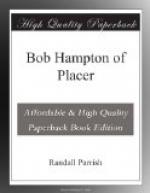“Your father and mine were for many years friends and army comrades. They saw service together during the great war, and afterward upon the plains in Indian campaigning. Unfortunately a slight misunderstanding arose between them. This, while not serious in itself, was made bitter by the interference of others, and the unaccountable jealousies of garrison life. One night they openly quarrelled when heated by wine, and exchanged blows. The following evening, your father chancing to be officer of the guard and on duty, my father, whose wife had then been dead a year, was thoughtless enough to accompany Mrs. Nolan home at a late hour from the post ball. It was merely an act of ordinary courtesy; but gossips magnified the tale, and bore it to Nolan. Still smarting from the former quarrel, in which I fear my father was in the wrong, he left the guard-house with the openly avowed intention of seeking immediate satisfaction. In the meanwhile Slavin, Murphy, and a trooper named Flynn, who had been to town without passes, and were half-drunk, stole through the guard lines, and decided to make a midnight raid on the colonel’s private office. Dodging along behind the powder-house, they ran suddenly upon my father, then on the way to his own quarters. Whether they were recognized by him, or whether drink made them reckless of consequences, is unknown, but one of the men instantly fired. Then they ran, and succeeded in gaining the barracks unsuspected.”
She sat as if fascinated by his recital.
“Your father heard the shot, and sprang toward the sound, only to fall headlong across my father’s lifeless body. As he came down heavily, his revolver was jarred out of its holster and dropped unnoticed in the grass. An instant later the guard came running up, and by morning Captain Nolan was under arrest, charged with murder. The circumstantial evidence was strong—his quarrel with the murdered man, his heated language a few moments previous, the revolver lying beside the body, having two chambers discharged, and his being found there alone with the man he had gone forth to seek. Slavin and Flynn both strengthened the case by positive testimony. As a result, a court martial dismissed the prisoner in disgrace from the army, and a civil court sentenced him to ten years’ imprisonment.”
“And my mother?” The question was a trembling whisper from quivering lips.
“Your mother,” he said, regretfully, “was an exceedingly proud woman, belonging to a family of social prominence in the East. She felt deeply the causeless gossip connecting her name with the case, as well as the open disgrace of her husband’s conviction. She refused to receive her former friends, and even failed in loyalty to your father in his time of trial. It is impossible now to fix the fault clearly, or to account for her actions. Captain Nolan turned over all his property to her, and the moment she could do so, she disappeared from the fort, taking you with her. From that hour none of her old acquaintances could learn anything regarding her whereabouts. She did not return to her family in the East, nor correspond with any one in the army. Probably, utterly broken-hearted, she sought seclusion in some city. How Gillis obtained possession of you remains a mystery.”




